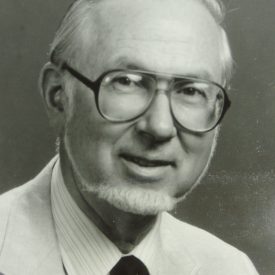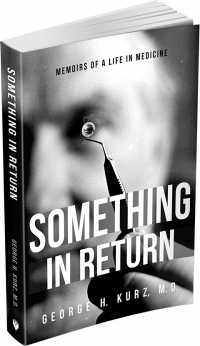
A Philadelphia native, George Kurz attended the University of Pennsylvania for his undergraduate and M.D. degrees and ophthalmology residency.
Dr. Kurz practiced at Hunterdon Medical Center in New Jersey and continued on the staff of that hospital until his retirement, when he was honored by appointment to the Emeritus Staff. He served as Clinical Associate Professor of Ophthalmology at New York University and Clinical Professor of Ophthalmology at Robert Wood Johnson Medical School.
Over the years Dr. Kurz travelled to China, Ecuador, the Philippines, as well as several places in Africa for teaching and patient care.
Dr. Kurz previously published Through the Port of Philadelphia: Memoirs of Charles Kurz, a book exploring the career of his father, a pioneer in the shipping world.
Since retirement Dr. Kurz has been involved with volunteer work for Habitat for Humanity, Bikes for the World, and teaching English as a second language. He lives in a retirement community in Pennsylvania.
Title by George H. Kurz
-

In this memoir, Dr. Kurz recounts many intriguing vignettes from his thirty-seven years in ophthalmology – some happy, some humorous, others tragic. All can be enjoyed without a background in medicine. In one particularly rewarding episode he taught ophthalmologists in Tanzania how to insert an artificial lens into the eye at the time of cataract removal and oversaw the first lens implantation ever in that country.
A construction engineer, previously unable to read blueprints because of cataracts, was so astounded with his restored vision when the bandage was removed that he blurted out “Well, I’ll be damned!” His exuberance epitomized the observation by Dr. Kurz’s professor that ophthalmology is a happy field.
Reviews
-
Lewis P. Bird, Ph.D., retired university professor (Medical Ethics)
Ah, to live a life worth living!
Have you ever wondered what the satisfactions of being a doctor are, particularly if you could make the blind see? What would it be like to practice both in pastoral America as well as in a well-established medical center in East Africa? Join the journey in this enthralling saga of one doctor’s dedication to duty as well as a bit of mischief on the side.
The opportunity to peek over the shoulder of an eye surgeon is rare. But now, however, in this fascinating memoir, Dr. George Kurz takes us on one adventure after another, both at home and abroad, when a physician is a Godsend. This gifted storyteller lets us discover how the heart of medicine beats.
“I couldn’t put it down!”
“I had to sneak peak the next chapter!”Here’s to a book bound to gladden any heart with an appreciation for hearty adventures combined with medical service. Book club aficionados – here’s your next choice.
– Lewis Penhall Bird, Ph.D., retired university professor (Medical Ethics)
-
Connie Paul
Well written and intriguing, George Kurz’s memoir held my interest from beginning to end. Inspired by Albert Schweitzer, rather than joining his family’s shipping business, he chose instead to help people see. He became an ophthalmologist who helped his patients not only in Hunterdon County, New Jersey, but also patients and their doctors in the underdeveloped world. What difference can one person make? Read this book and find out.
-
Bob Scherer
Dr. George Kurz has given us a special gift in this book about his life through a series of vignettes, one more special than the next. George’s writing style is quite easy to read and very hard to put down. His injection of humor and life lessons about people make the book a true joy to experience. George is very honest and candid about his successes and in places he could have done better. Throughout his story he credits the people who supported him and encouraged him at times when he needed it. His ability to live his beliefs won over many skeptics. His faith has sustained him throughout his life.
He was fortunate to be reared in a loving family. His father was successful in his profession and George had a good home life. The majority of his education was at independent Quaker schools, at which he developed a desire to help others and to leave the world a better place than it would have been had he not been born. His decision to become a doctor was influenced by Dr. Albert Schweitzer’s writings, and by a Quaker George met through his school who truly lived his creed and showed others how it could be done. George’s recounting of his service in Europe, China, and throughout Africa including Nigeria, Uganda, and Tanzania are fascinating as well as educational.
In writing a review one is tempted to try to cover all the book contains but it is difficult to determine what to include and what not to include. It is all amazing. You must read it for yourself. “Something In Return” is the perfect name for his book and George’s life. It is a testament to his success in leaving the world a better place.